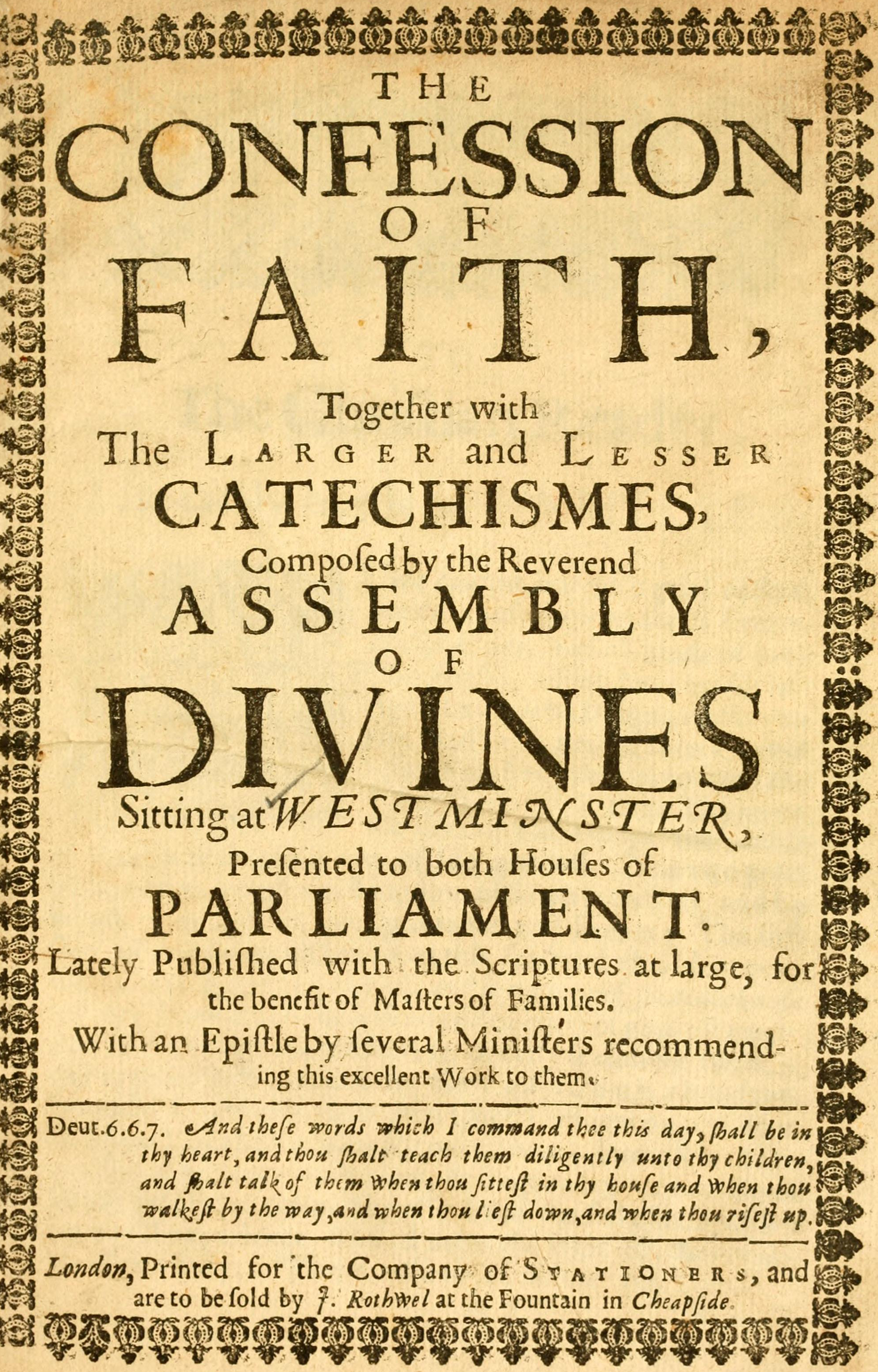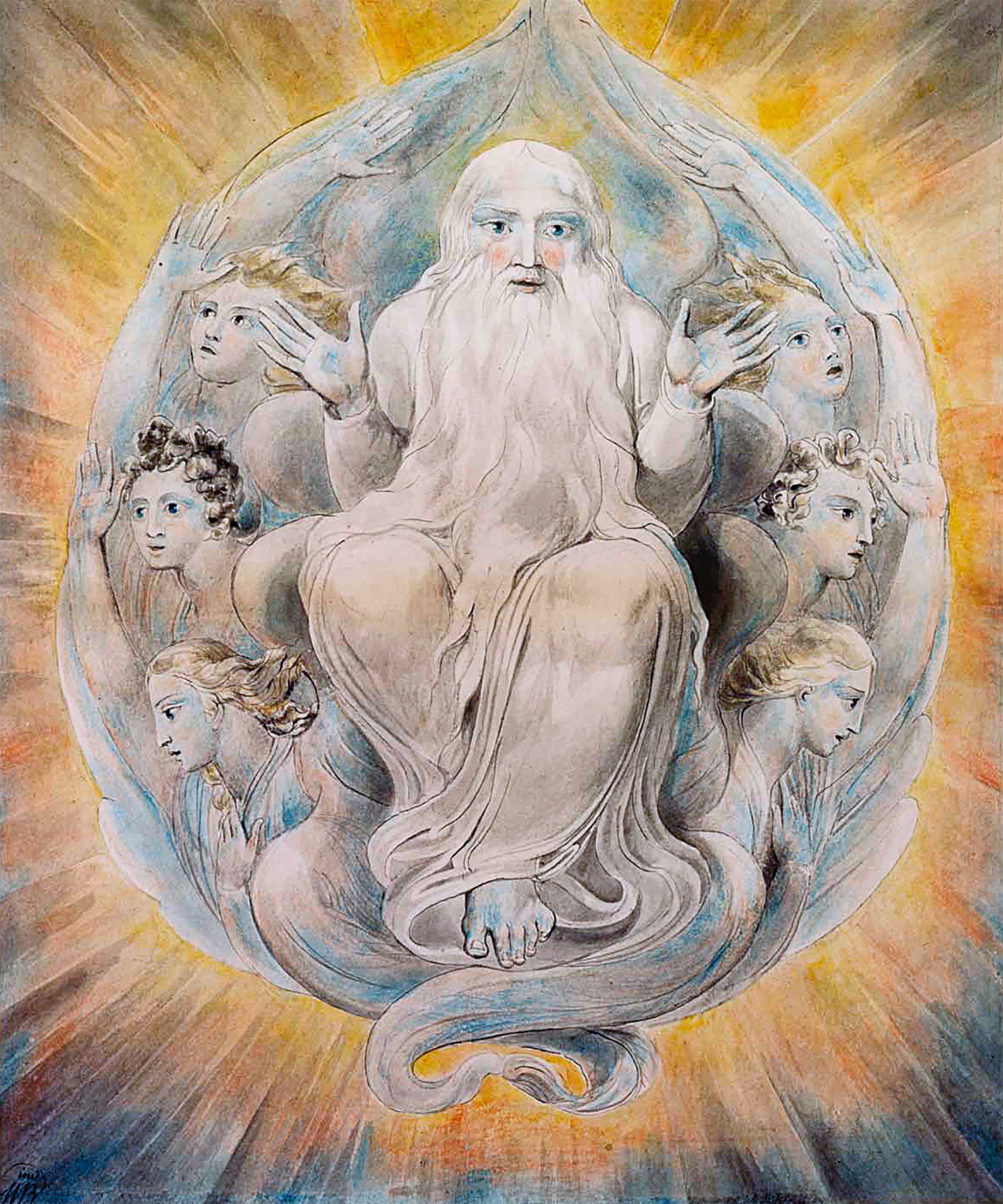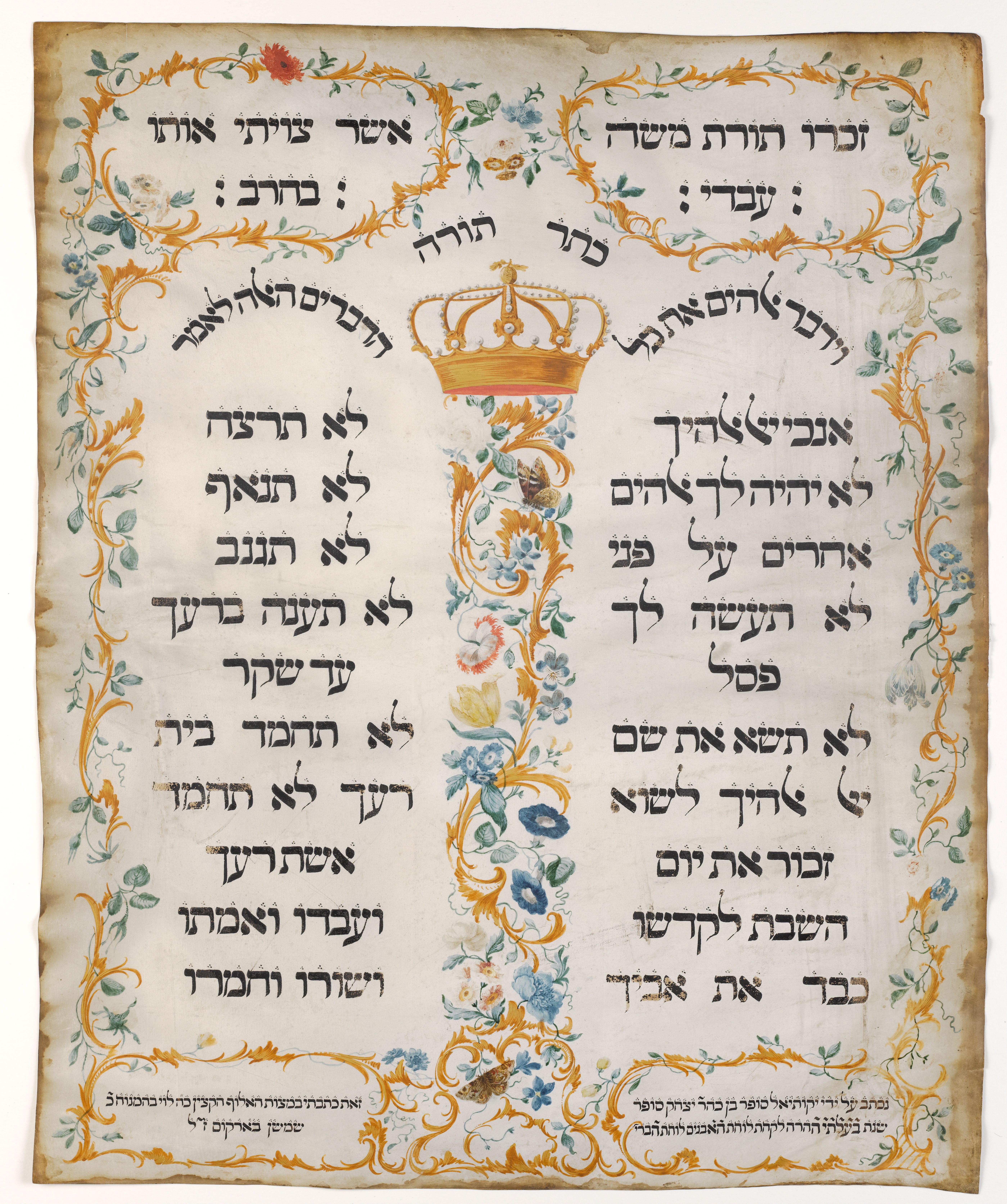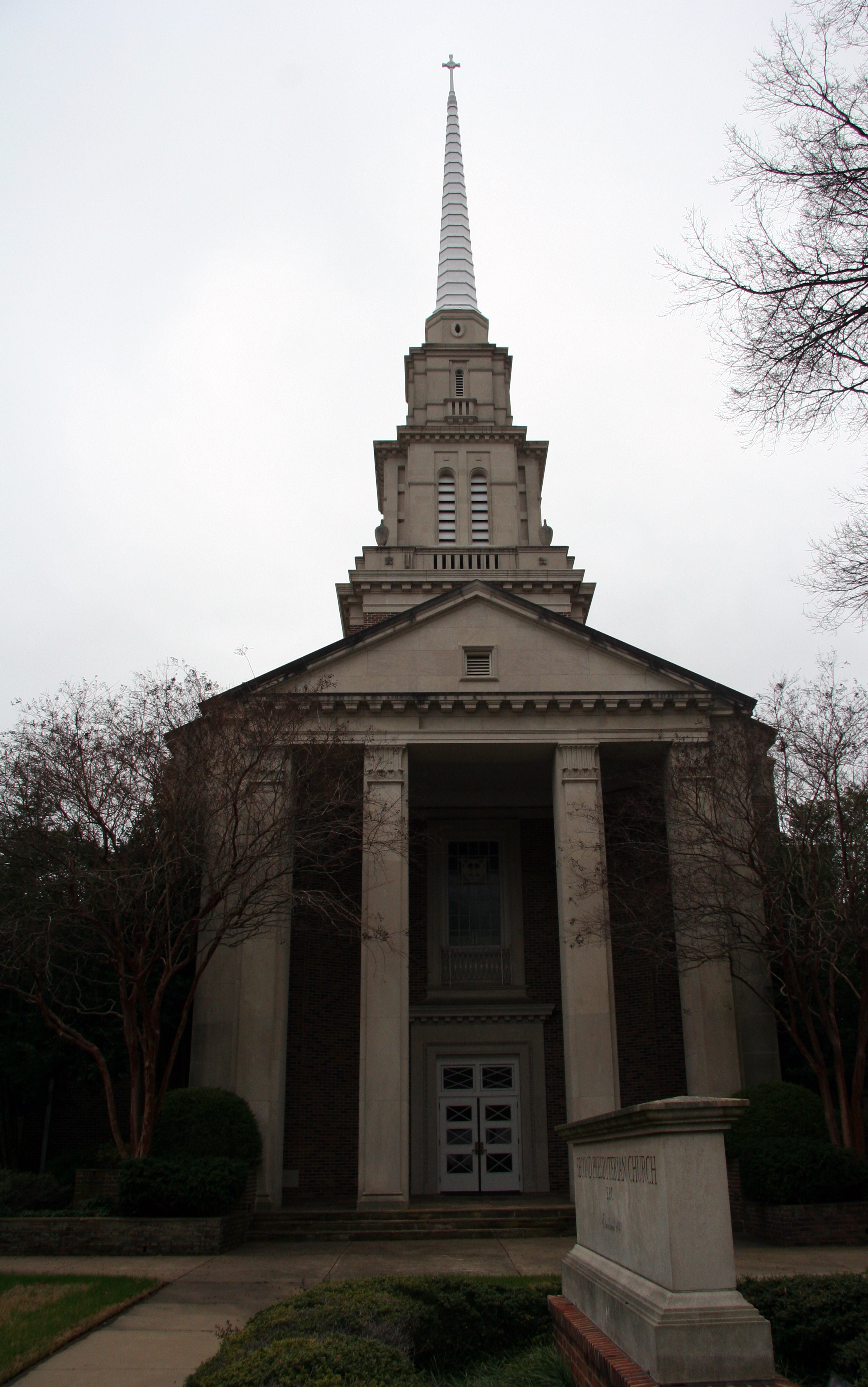|
Westminster Larger Catechism
The Westminster Larger Catechism, along with the Westminster Shorter Catechism, is a central catechism of Calvinists in the English tradition throughout the world. History In 1643 when the Long Parliament of England called the Westminster Assembly to produce the Westminster Confession, it also asked for a directory of "catechising". The Assembly asked Herbert Palmer to produce a draft of the Larger Catechism. Robert Baillie and other Scottish delegates found the work disappointing. In December 1643 a committee was formed to write the Catechism. In January 1647 the Assembly gave up writing one catechism and split it into two. The Westminster Shorter Catechism was to be "easier to read and concise for beginners" and the Larger Catechism was to be "more exact and comprehensive". The Catechism was completed by the Westminster Assembly in 1647. It was then adopted by the General Assembly of the Church of Scotland in 1648 and (with modifications relating to the civil magistr ... [...More Info...] [...Related Items...] OR: [Wikipedia] [Google] [Baidu] |
Westminster Standards
The Westminster Standards is a collective name for the documents drawn up by the Westminster Assembly (1643–1649). These include the Westminster Confession of Faith, the Westminster Shorter Catechism, the Westminster Larger Catechism, the Directory of Public Worship, and the Form of Church Government, and represent the doctrine and church polity of 17th century English and Scottish Presbyterianism. The Westminster Confession of Faith and Larger and Shorter Catechism have been adopted as doctrinal standards by a number of Reformed and Presbyterian Christian denominations, but not the Church of Scotland nor those derived directly from it. Following the approval of the Confession and catechisms by the Church of Scotland in 1648, printers in England and Scotland began publishing them with other religious documents in collections referred to as the Westminster Standards. In 1658 printers began including the full Scripture passages which are cited in the confessional documents. These ... [...More Info...] [...Related Items...] OR: [Wikipedia] [Google] [Baidu] |
Presbyterian Church (U
Presbyterianism is a historically Reformed Protestant tradition named for its form of church government by representative assemblies of elders, known as "presbyters". Though other Reformed churches are structurally similar, the word ''Presbyterian'' is applied to churches that trace their roots to the Church of Scotland or to English Dissenter groups that were formed during the English Civil War, 1642 to 1651. Presbyterian theology typically emphasises the sovereignty of God, the authority of the Scriptures, and the necessity of grace through faith in Christ. Scotland ensured Presbyterian church government in the 1707 Acts of Union, which created the Kingdom of Great Britain. In fact, most Presbyterians in England have a Scottish connection. The Presbyterian denomination was also taken to North America, Australia, and New Zealand, mostly by Scots and Scots-Irish immigrants. Scotland's Presbyterian denominations hold to the Reformed theology of John Calvin and his imme ... [...More Info...] [...Related Items...] OR: [Wikipedia] [Google] [Baidu] |
Original Sin
Original sin () in Christian theology refers to the condition of sinfulness that all humans share, which is inherited from Adam and Eve due to the Fall of man, Fall, involving the loss of original righteousness and the distortion of the Image of God. The biblical basis for the belief is generally found in Fall of man#Genesis 3, Genesis 3 (the story of the expulsion of Adam and Eve from the Garden of Eden), and in texts such as ("I was brought forth in iniquity, and in sin did my mother conceive me") and ("Therefore, just as sin entered the world through one man, and death through sin, and in this way death came to all people, because all sinned"). The specific doctrine of original sin was developed in the 2nd century struggle against Gnosticism by Irenaeus of Lyons, and was shaped significantly by Augustine of Hippo (354–430 AD), who was the first author to use the phrase "original sin". Influenced by Augustine, the Councils of Carthage (411–418 AD) and Council of Orange ... [...More Info...] [...Related Items...] OR: [Wikipedia] [Google] [Baidu] |
Creator Deity
A creator deity or creator god is a deity responsible for the creation of the Earth, world, and universe in human religion and mythology. In monotheism, the single God is often also the creator. A number of monolatristic traditions separate a secondary creator from a primary transcendent being, identified as a primary creator.(2004) Sacred Books of the Hindus Volume 22 Part 2: Pt. 2, p. 67, R.B. Vidyarnava, Rai Bahadur Srisa Chandra Vidyarnava Monotheism Atenism Initiated by Pharaoh Akhenaten and Queen Nefertiti around 1330 BCE, during the New Kingdom period in ancient Egyptian history. They built an entirely new capital city ( Akhetaten) for themselves and worshippers of their sole creator god in a wilderness. His father used to worship Aten alongside other gods of their polytheistic religion. Aten, for a long time before his father's time, was revered as a god among the many gods and goddesses in Egypt. Atenism was countermanded by later pharaoh Tutankhamun, as chro ... [...More Info...] [...Related Items...] OR: [Wikipedia] [Google] [Baidu] |
Apostles' Creed
The Apostles' Creed (Latin: ''Symbolum Apostolorum'' or ''Symbolum Apostolicum''), sometimes titled the Apostolic Creed or the Symbol of the Apostles, is a Christian creed or "symbol of faith". "Its title is first found c.390 (Ep. 42.5 of Ambrose). ... Th presentform seems to have had a Hispano-Gallic origin ...". The creed most likely originated as a development of the Old Roman Symbol: the old Latin creed of the 4th century. It has been used in the Latin liturgical rites since the 8th century and, by extension, in the various modern branches of Western Christianity, including the modern liturgy and catechesis of the Catholicism, Lutheranism, Anglicanism, Presbyterianism, Methodism, Moravianism and Congregationalism. It is shorter than the full Niceno-Constantinopolitan Creed adopted in 381, but it is still explicitly trinitarian in structure, with sections affirming belief in God the Father, God the Son, and God the Holy Spirit. It does not address some Christological is ... [...More Info...] [...Related Items...] OR: [Wikipedia] [Google] [Baidu] |
Ten Commandments
The Ten Commandments (), or the Decalogue (from Latin , from Ancient Greek , ), are religious and ethical directives, structured as a covenant document, that, according to the Hebrew Bible, were given by YHWH to Moses. The text of the Ten Commandments appears in three markedly distinct versions in the Bible: at Exodus , Deuteronomy , and the " Ritual Decalogue" of Exodus . The biblical narrative describes how God revealed the Ten Commandments to the Israelites at Mount Sinai amidst thunder and fire, gave Moses two stone tablets inscribed with the law, which he later broke in anger after witnessing the worship of a golden calf, and then received a second set of tablets to be placed in the Ark of the Covenant. Scholars have proposed a range of dates and contexts for the origins of the Decalogue. “Three main dating schemes have been proposed: (1) it was suggested that the Decalogue was the earliest legal code given at Sinai, with Moses as author, and the Amphictyony con ... [...More Info...] [...Related Items...] OR: [Wikipedia] [Google] [Baidu] |
Lord's Prayer
The Lord's Prayer, also known by its incipit Our Father (, ), is a central Christian prayer attributed to Jesus. It contains petitions to God focused on God’s holiness, will, and kingdom, as well as human needs, with variations across manuscripts and Christian traditions. Two versions of this prayer are recorded in the gospels: a longer form within the Sermon on the Mount in the Gospel of Matthew, and a shorter form in the Gospel of Luke when "one of his disciples said to him, 'Lord, teach us to pray, as John taught his disciples. Scholars generally agree that the differences between the Matthaean and Lucan versions of the Lord’s Prayer reflect independent developments from a common source. The first-century text '' Didache'' (at chapter VIII) reports a version closely resembling that of Matthew and the modern prayer. It ends with the Minor Doxology. Theologians broadly view the Lord’s Prayer as a model that aligns the soul with God’s will, emphasizing praise, tr ... [...More Info...] [...Related Items...] OR: [Wikipedia] [Google] [Baidu] |
Martin Luther
Martin Luther ( ; ; 10 November 1483 – 18 February 1546) was a German priest, Theology, theologian, author, hymnwriter, professor, and former Order of Saint Augustine, Augustinian friar. Luther was the seminal figure of the Reformation, Protestant Reformation, and his theological beliefs form the basis of Lutheranism. He is widely regarded as one of the most influential figures in Western world, Western and History of Christianity, Christian history. Born in Eisleben, Luther was ordained to the Priesthood in the Catholic Church, priesthood in 1507. He came to reject several teachings and practices of the contemporary Catholic Church, Roman Catholic Church, in particular the view on indulgences and papal authority. Luther initiated an international debate on these in works like his ''Ninety-five Theses'', which he authored in 1517. In 1520, Pope Leo X demanded that Luther renounce all of his writings, and when Luther refused to do so, Excommunication in the Catholic Church, ... [...More Info...] [...Related Items...] OR: [Wikipedia] [Google] [Baidu] |
Reformed Tradition
Reformed Christianity, also called Calvinism, is a major branch of Protestantism that began during the 16th-century Protestant Reformation. In the modern day, it is largely represented by the Continental Reformed Christian, Presbyterian, Congregational, and Waldensians traditions, as well as parts of the Methodist, Anglican (known as "Episcopal" in some regions) and Baptist traditions. Reformed theology emphasizes the authority of the Bible and the sovereignty of God, as well as covenant theology, a framework for understanding the Bible based on God's covenants with people. Reformed churches emphasize simplicity in worship. Several forms of ecclesiastical polity are exercised by Reformed churches, including presbyterian, congregational, and some episcopal. Articulated by John Calvin, the Reformed faith holds to a spiritual (pneumatic) presence of Christ in the Lord's Supper. Emerging in the 16th century, the Reformed tradition developed over several generati ... [...More Info...] [...Related Items...] OR: [Wikipedia] [Google] [Baidu] |
Catechesis
Catechesis (; from Greek: , "instruction by word of mouth", generally "instruction") is basic Christian religious education of children and adults, often from a catechism book. It started as education of converts to Christianity, but as the religion became institutionalized, catechesis was used for education of members who had been baptized as infants. As defined in the Catechism of the Catholic Church, paragraph 5 (quoting Pope John Paul II's Apostolic Exhortation '' Catechesi tradendae'', §18): ''Catechesis'' is an education in the faith of children, young people and adults which includes especially the teaching of Christian doctrine imparted, generally speaking, in an organic and systematic way, with a view to initiating the hearers into the fullness of Christian life. Nomenclature In the Catholic Church, catechist is a term used of anyone engaged in religious formation and education, from the bishop to lay ecclesial ministers and clergy to volunteers at the local le ... [...More Info...] [...Related Items...] OR: [Wikipedia] [Google] [Baidu] |
Bible Presbyterian Church
The Bible Presbyterian Church is an Protestantism in the United States, American Protestant denomination in the Reformed tradition. It was founded by members of the Orthodox Presbyterian Church over differences on Christian eschatology, eschatology and Christian views on alcohol, abstinence, after having left the Presbyterian Church in the United States of America over the rise of Liberal Christianity, modernism. The denomination comprises 28 churches, 27 in the United States and 1 church in Alberta, Canada divided between the Great Western Presbytery, the Eastern Presbytery, the Great Lakes Presbytery, and the Florida Presbytery. The highest governing body is the Synod. History Origin The Bible Presbyterian Church (BPC) was formed in 1937, predominantly through the efforts of such Religious conservatism, conservative Presbyterian clergymen as Carl McIntire, J. Oliver Buswell and Allan MacRae. Francis Schaeffer was the first minister to be ordained in the new denomination (1938) ... [...More Info...] [...Related Items...] OR: [Wikipedia] [Google] [Baidu] |
Evangelical Presbyterian Church (United States)
The Evangelical Presbyterian Church (EPC) is an American church body holding to presbyterian governance and Reformed theology. It is a conservative Calvinist denomination. It is most distinctive for its approach to the way it balances certain liberties across congregations on "non-essential" doctrines, such as egalitarianism /complementarianism in marriage or the ordination of women, alongside an affirmation of core "essential" doctrinal standards. The motto of the Evangelical Presbyterian Church is " In Essentials, Unity. In Non-Essentials, Liberty. In All Things, Charity; Truth In Love." The Office of the General Assembly is in Orlando, Florida. History The EPC began as a result of prayer meetings in 1980 and 1981 by pastors and elders increasingly alienated by liberalism in the "northern" branch of Presbyterianism (the United Presbyterian Church in the U.S.A., a predecessor of the Presbyterian Church (USA)). Two cases served as important catalysts in their separation: the ... [...More Info...] [...Related Items...] OR: [Wikipedia] [Google] [Baidu] |










